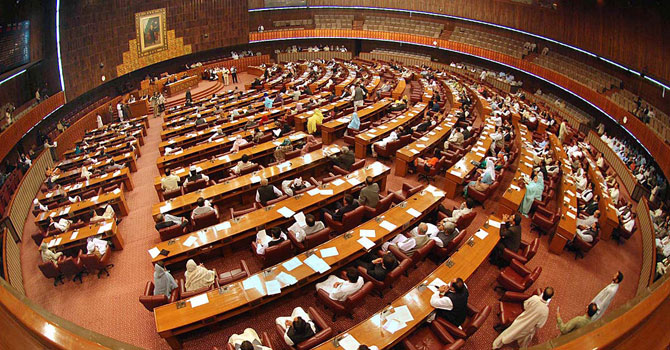
ISLAMABAD, Dec 13: Supreme Court Registrar Dr Faqir Hussain has once again snubbed the Public Accounts Committee (PAC) of the National Assembly by refusing to appear before it for the settlement of court’s accounts.
To rub salt into the committee’s wounds, the registrar, besides formally conveying his refusal to the committee, issued a statement to the media on Thursday arguing how the parliamentary committee lacked constitutional support to summon him.
After duly soliciting legal opinion from constitutional experts on Nov 29, the PAC had asked for the registrar’s personal appearance on Friday (today) for what it believed mandatory settlement of the SC’s accounts.
The issuance of the press release just couldn’t be a coincidence. According to it, the PAC has been duly informed vide Supreme Court’s letter No F.1-7/2008-2009/B&A dated Dec 11 that under the Constitution and law, the registrar wasn’t supposed to appear before the committee.
“A formal letter was more than enough to inform the PAC about his (registrar) position, and there was no need to issue the press release which will definitely anger the parliamentarians sitting on the committee,” a senior Supreme Court lawyer said.
Nadeem Afzal Gondal, the PAC chairman, was not available for comment. However, the People’s Party’s Yasmin Rehman, who is a member of the PAC, told Dawn that as per its constitutional role, the committee had only asked for details about the apex court’s administrative expenditures through its registrar.
Yasin Azad, the former president of Supreme Court Bar Association, who was also one of the constitutional experts who had spoken in favour of the PAC decision, said: “I am of the opinion that the SC registrar should appear before the committee.”
A staff member of the National Assembly Secretariat said that under clause (3) of Article 66 of the Constitution, the committee had powers vested in civil court under the Code of Civil Procedure 1908 (Act V of 1908) to enforce the attendance of any person and compel the production of documents.
Article 66 (3) of the Constitution reads: “Provision may be made by law for the punishment, by a House, of persons who refuse to give evidence or produce documents before a committee of the House when duly required by the chairman of the committee so to do.”
He said now it was up to the PAC chairman whether he wanted to go ahead and invoke this constitutional provision to enforce attendance of the SC registrar.
Yasmin Rehman said the committee would hold an internal meeting to decide its future course of action.
The PAC had on Oct 11 invited former law minister and sitting Senator Aitzaz Ahsan, former senator and veteran SC lawyer S.M. Zafar, former chairman of the Senate Wasim Sajjad, Justice (retd) Tariq Mehmood, Yasin Azad and Justice (retd) Shabbar Raza Rizvi to seek their opinion.
They all supported the committee’s decision to summon the registrar. The law secretary and the Auditor General of Pakistan have also spoken in favour of the PAC decision. They were of the opinion that like any other principal accounts officer of a government department, the registrar could not refuse to appear before the PAC
The SC registrar had refused to appear before PAC in 2009, too.
Until 2004-05, the registrar used to appear before the committee like other principal accounting officers of government departments.
The press statement issued on Thursday said the issue of registrar’s appearance before the PAC had been discussed in several full court meetings wherein “it was decided that under the Constitution as well as the law, the PAC is not competent to scrutinise the accounts of the SC. Hence the registrar is not required to appear before it”.
To further substantiate his position, the statement referred to the preamble of the Constitution which states, “… it is the will of the people of Pakistan to establish an order; wherein the independence of the judiciary shall be fully secured;” to materialise this objective, the Constitution [vide Art 175(3)] ordains the separation of the judiciary from the executive.”
It also quoted an address to the Constituent Assembly (on April 10, 1973) of the then president (late Zulfikar Ali Bhutto) who had said: “In a parliamentary system the legislature has to be supreme, but the supremacy of the legislature is not unfettered. The supremacy of the legislature has been restricted by the incorporation to the fundamental rights. And these fundamental rights have been protected by a provision for the independence of judiciary.”
And to fortify the principle, Article 68 puts restriction on discussion in parliament with respect to the conduct of any judge of the superior courts.
The registrar also reiterated his earlier position that since the SC drew its expenditures from the consolidate fund, and not from the public accounts, these could not be taken up by the PAC for settlement.
“It has also been clarified to the PAC that the accounts of the apex court have been continuously audited by the federal audit. The SC administration has never declined the auditing of its accounts. The last annual external audit of accounts of this court for the financial year 2009-10 was conducted in Sept 2010, whereas the external audit for the years 2010-11 and 2011-12 is awaited,” the statement said.












































Dear visitor, the comments section is undergoing an overhaul and will return soon.